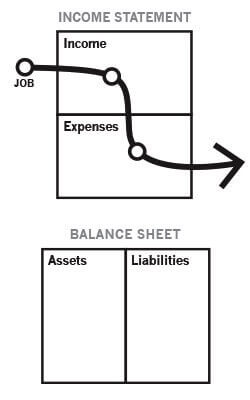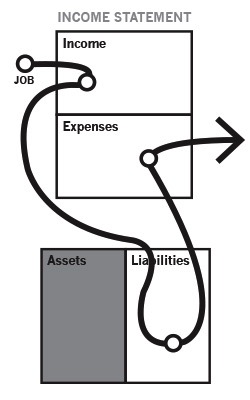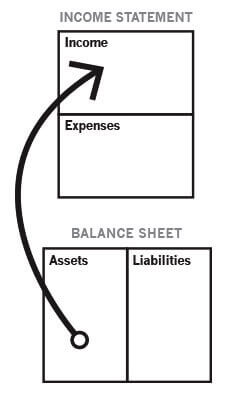New Rule of Money #3:
Learn How to Control Cash Flow
Do you have the cash flow pattern of the rich?
This is the third in a series on the new rules of money. I lay the foundation for this series in my post “The Real Reason You Feel (and Are) Poorer”. I highly suggest you read that post in preparation for this and the following posts on the new rules of money.
The most important words in business and investing are cash flow.
Today, many people are in financial trouble because they have too much cash flowing out of their pockets and very little money flowing into their pockets. If you’re going to be financially secure, however, you need to learn to have more cash flow into your pockets.
I’ve found that there are three patterns of cash flow. Those of the poor, the middle class, and the rich.
Cash flow pattern of the poor
You'll often hear those who struggle mightily when it comes to finances say, "I'm living paycheck to paycheck." The unfortunate reality for those who are poor is that they make hardly enough to pay their monthly expenses. They are hard workers, often do-ing two jobs just to make ends meet, but they have a hard time getting ahead because they are simply treading water.
The cash flow pattern of the poor looks like this:

Cash flow pattern of the middle class
The middle class also often live paycheck to paycheck, but for different reasons and in a different way. This is the cash flow pattern of the middle class:

This cash flow pattern is considered typical and smart by our society. After all, the people who have this pattern probably have high-paying jobs, nice homes, cars, and credit cards. This is what my rich dad called the "working-class dream."
After putting aside some money into a 401(k), the middle class cash flow pattern in-volves using spare money for all sorts of toys and liabilities that don't put money in your pocket but instead take money out. It is the Rat Race.
Over time, you build a lifestyle that must be maintained by either getting a higher paid job or working longer hours. And if you get fired or laid off, everything comes crash-ing down.
Cash flow pattern of the rich
This is the cash flow pattern of the rich:

This is the thought pattern rich dad wanted his son and me to have as young children. He never wanted us to become addicted to the idea of a high-paying job. He wanted us to develop the thought pattern of thinking only in assets and income in the form of capital gains, dividends, rental income, and residual income from businesses and roy-alties.
Thinking like the rich
If you want to be successful in the Information Age, the faster you develop your finan-cial and emotional intelligence, the faster you will feel more financially secure and find financial freedom. In a world with less and less job security, this cash flow pattern makes much more sense to me. And to achieve this pattern, you need to see the world from the perspective of a business owner and investor, not an employee or self-employed person.
One of the most important things my rich dad taught me to do was to control my per-sonal cash flow and to monitor the world’s cash flow. He taught me to monitor global cash flow by observing three things:
- Jobs: For years jobs have flowed overseas from the US. Many jobs that used to pay a lot, no longer exist in America.
- People: The flow of jobs out of the US has led many to find new careers. This often means moving to a new city or even country where certain industries are thriving. I like to invest in markets where people are moving to, not from.
- Cash: During the great recession, we saw cash flow out of the stock market and into savings, mattresses, bonds, and gold—in other words, safe havens. Today, money is flowing back into the stock market, but for how long? In order to be rich, you must be on top of where the cash is flowing and move accordingly, before others get there.
Last week, we talked about the power of good debt. Learning how to use debt is one of the most important skills a person can learn. And in important lesson is that debt is only as good as your cash flow. Debt that causes cash to flow into your bank account is good. Debt that takes money out is bad.
My partners and I create cash flow for ourselves by watching the global movement of cash. For instance, we invest using debt to purchase apartment buildings in areas where there are good jobs, areas where people are flowing and money is moving to. In simple terms, real estate is not worth much if there are no jobs. Jobs attract people. And where people are moving, cash is flowing. It’s simple, but most people are not trained to look for these things. As a result, their cash flow suffers.
Niciun comentariu:
Trimiteți un comentariu